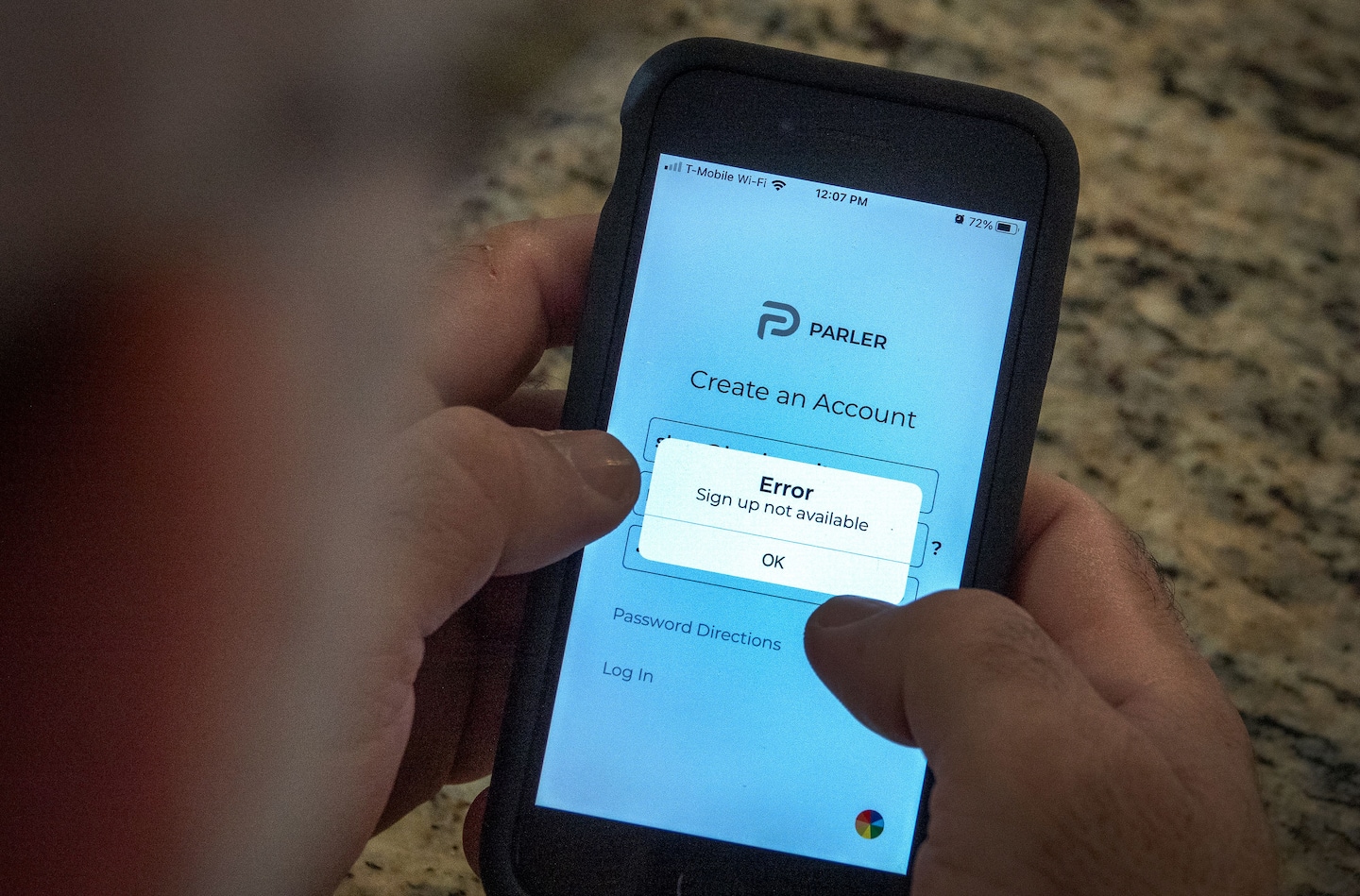Seldom-seen Amazon unit made the call that brought down pro-Trump Parler

Two days later, Peikoff replied that the post, “as hateful as it is,” isn’t a violation of Parler’s terms of service, according to filings in a lawsuit that seeks to reverse Amazon’s decision over the weekend to suspend the social network as a customer of its cloud-computing service, effectively silencing it.
The ability of companies such as Facebook, Twitter and Google to control what people see online is so potent, it is the subject of antitrust hearings. YouTube suspended President Trump from uploading new videos to his official account for at least a week late Tuesday. But the decision by Amazon to push Parler off its dominant cloud-computing service illustrates just how powerful its content-moderation capabilities are as well.
(Amazon chief executive Jeff Bezos owns The Washington Post.)
On Wednesday, the White House Twitter account shared a video statement from Trump in which he jabbed at the “unprecedented assault on free speech we have seen in recent days,” without naming companies such as Twitter, Facebook or Google that have taken actions against him.
But the companies that provide the technical infrastructure that powers websites and services where people express opinions have vast power as well, though they rarely use it. They include little-known companies that register website domains for customers; so-called content delivery networks, which can boost the speed at which webpages load; and Internet service providers, which connect homes and businesses to the Web.
“We’ve been too narrow in thinking about speech on the Internet being about social media,” said Margaret O’Mara, a history professor at the University of Washington and the author of “The Code: Silicon Valley and the Remaking of America,” a chronicle of the tech industry.
Customer service company Zendesk and security firm Okta also dropped Parler as a customer, furthering its tumble off the Web.
“The last five days have been a demonstration of these companies’ remarkable market power,” O’Mara said.
That power led Texas Attorney General Ken Paxton on Wednesday to issue formal legal demands to Amazon, Apple, Facebook, Google and Twitter, aiming to investigate their recent moves to ban President Trump and shut down Parler. Those companies announced a wave of an enforcement actions to stop Trump and his supporters from inciting further violence after the deadly siege at the U.S Capitol last week.
The criticism that tech giants are silencing conservatives by Paxton, the recent target of a whistleblower complaint and fraud investigation, comes months after the Texas attorney general huddled with Trump at a private White House meeting about allegations anti-conservative bias on social-media sites. The president specifically pressed Republican officials to use their investigative powers to probe censorship charges, the Post reported at the time.
There are few companies that have more power on the Web than Amazon. Its Amazon Web Services is the dominant provider of cloud infrastructure services, which let customers rent data storage and processing capabilities over the Web instead of running their own data centers. AWS, which competes against Microsoft and Google, held 45 percent of the global market in 2019, according to the market research firm Gartner.
But Amazon hasn’t often proactively policed the content of customers — which include Airbnb, Yelp and Netflix, among others. Rather, its Trust & Safety team, which has fewer than 100 workers, acts only on complaints received.
In its reply to Parler’s suit, Amazon said it received reports in mid-November that the social network was “hosting content threatening violence.” Amazon’s filing included emails its executives sent to Peikoff with dozens of examples of Parler users calling for violence, including killing Democrats, Republicans who haven’t supported Trump’s efforts to overturn the November election, members of the Black Lives Matter and antifa movements, professional athletes, tech executives, and even the police.
(Amazon redacted the names of its executives to protect their safety after “significant and repeated threats of physical violence against AWS, its facilities and its employees” when it suspended Parler, according to a legal filing.)
Parler took down all of the offensive content Amazon brought to its attention, the company claims in its filing.
“AWS knew its allegations contained in the letter it leaked to the press that Parler was not able to find and remove content that encouraged violence was false — because over the last few days Parler had removed everything AWS had brought to its attention and more,” Parler’s suit claims.
The small company accused Amazon of making it a “pariah,” and alleged that some of the same language contained in the posts was also available on Twitter.
Twitter, like Facebook, employs a small army of content moderators, paired with artificial intelligence technology, to seek out and remove posts that violate its terms of service. By contrast, Parler relied largely on a system of volunteer jurors to remove content deemed offensive.
According to its filing, Amazon deemed that approach insufficient, and a breech of the acceptable use policy for its customers that bars content that, among other restrictions, “may be harmful to others.” Parler’s chief executive told Amazon executives during a phone call this month that the company “had a backlog of 26,000 reports of content that violated its community standards and remained on its service,” the filing alleges.
Rebuilding its service, which also suffered blows when Apple and Google removed Parler from their app stores, will take significant time to work properly with another hosting service, the company claims in its suit. It accused Amazon of conspiring with Twitter to take the smaller competitor offline just as it was significantly gaining users in the wake of Twitter permanently banning Trump.
“Worse than the timing is the result — Parler has tried to find alternative companies to host it and they have fallen through,” Parler claims in its filing. “It has no other options. Without AWS, Parler is finished as it has no way to get online.”






